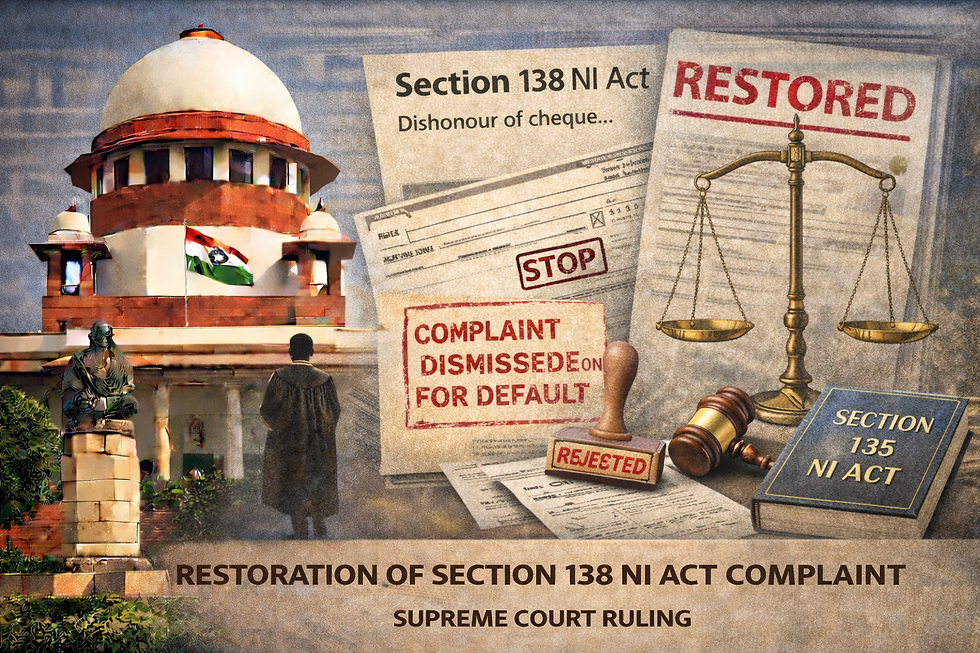'Wisdom Dawned Upon the Parties': Supreme Court Upholds Amicable Settlement in Banking Dispute
- Chintan Shah

- Mar 26, 2025
- 3 min read
Summary of the Judgment
Case Name: Akshay Gupta & Ors. v. ICICI Bank Ltd. & Ors.
Court: Supreme Court of India
Date of Judgment: 25 March 2025
Judges: Hon’ble Justice Vikram Nath and Hon’ble Justice Sanjay Karol
Relevant Acts & Sections: Section 23 of the Consumer Protection Act, 1986
Introduction
The Supreme Court of India, in its recent judgment in Akshay Gupta & Ors. v. ICICI Bank Ltd. & Ors., has provided crucial legal insights into consumer rights, banking regulations, and the scope of unfair trade practices. The case, arising under the Consumer Protection Act, 1986, highlights the interplay between financial institutions, homebuyers, and real estate developers, addressing disputes over loan recall notices and allegations of unfair banking practices. The judgment, delivered by Hon’ble Justices Vikram Nath and Sanjay Karol, serves as a significant precedent in consumer and banking law.
Factual Background
The dispute in this case involved multiple appellants who had taken home loans from ICICI Bank to purchase flats developed by Rajsanket Realty Ltd. The crux of the issue revolved around the bank issuing loan recall notices, alleging defaults by the borrowers. The appellants, however, contended that the bank had engaged in unfair trade practices and violated Reserve Bank of India (RBI) guidelines. The matter was initially heard by the National Consumer Dispute Redressal Commission (NCDRC), which ruled against the appellants. Dissatisfied with this outcome, the appellants approached the Supreme Court under Section 23 of the Consumer Protection Act, 1986.
Key Legal Issues
Legality of the Loan Recall Notices
The appellants challenged the bank’s decision to issue loan recall notices, arguing that it was arbitrary and did not comply with fair banking practices as mandated by the RBI.
Unfair Trade Practices by the Bank
The appellants contended that the bank failed to fulfil its obligations in a transparent manner, imposing undue financial burdens on them.
Liability of the Builder in Loan Default
The appellants alleged that the builder, Rajsanket Realty Ltd., had defaulted on certain commitments, which indirectly impacted their loan obligations.
Supreme Court’s Observations
The Supreme Court, while analysing the facts and arguments, observed that the dispute was not just between the borrowers and the bank but also involved the builder, leading to a complex financial arrangement. The Court emphasised that the resolution of such issues must be fair and equitable to all parties involved.
One of the most notable aspects of the judgment was the Court’s remark:
"Wisdom dawned upon the three parties in a commercial arrangement to settle the dispute amicably, of course, with a little effort by the Court."
This statement highlights the Court’s inclination towards encouraging settlements that serve the interests of all stakeholders rather than prolonging litigation.
Resolution of the Dispute
The Supreme Court facilitated a settlement between the parties, which included the following key terms:
Waiver of Charges
ICICI Bank agreed to waive outstanding charges and provide a 30% discount on pre-EMI payments if the principal outstanding amount was settled upfront.
Builder’s Contribution
The builder, Rajsanket Realty Ltd., agreed to pay 50% of the pre-EMI amount owed by the appellants.
Payment Schedule
The appellants agreed to pay their outstanding principal amounts within a stipulated time, ensuring closure of the loan accounts.
Issuance of No Objection Certificate (NOC)
Upon full compliance with the settlement terms, ICICI Bank was directed to issue NOCs to the borrowers.
Implications of the Judgment
1. Strengthening Consumer Rights in Banking
This case reinforces the importance of fair banking practices. By scrutinising the bank’s loan recall process, the Supreme Court has signalled that financial institutions must act transparently and in good faith.
2. Encouragement of Alternative Dispute Resolution (ADR)
The Court’s role in facilitating an amicable settlement aligns with the growing preference for ADR mechanisms such as mediation and negotiated settlements in commercial disputes.
3. Accountability of Builders in Homebuyer Loans
The judgment clarifies that real estate developers cannot escape their responsibilities in cases where their defaults impact buyers’ financial obligations. This principle strengthens the legal position of homebuyers in similar cases.
4. Impact on RBI Regulations and Banking Policies
Financial institutions may need to reassess their policies on loan recalls to ensure compliance with regulatory guidelines and consumer protection norms. The judgment underscores the need for due diligence before taking coercive actions against borrowers.
Conclusion
The Supreme Court’s ruling in Akshay Gupta & Ors. v. ICICI Bank Ltd. & Ors. is a landmark judgment in consumer and banking law. By advocating for fair banking practices, protecting consumer interests, and ensuring a balanced approach to financial disputes, the Court has set a vital precedent for future cases.
The ruling underscores the significance of constructive negotiations in legal disputes and highlights the judiciary’s role in ensuring equitable resolutions. As the Indian legal landscape evolves, this judgment will serve as a reference point for legal professionals navigating the intersection of consumer rights, banking laws, and real estate regulations.



Comments